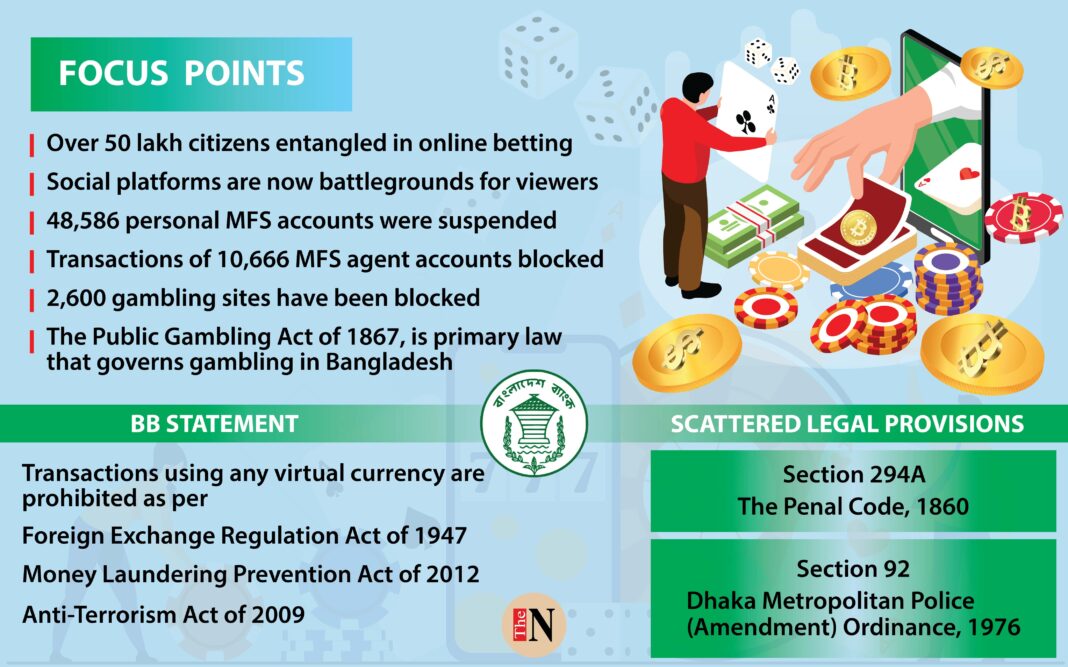Syed Shemul Parvez :
Driven by newer technology and consumer preferences, online gambling rings and various fraud gangs are becoming active on a massive scale across the country.
Sources concerned said a large number of people, including teenager and youths, are getting involved with the crimes in a large number day by day.
As a result, people are falling victims to the crime syndicates leading to social unrest and family discords.
Experts said online betting is normally witnessing a surge in Bangladesh during the ICC Cricket World Cup as well as others significant international tournaments.
These occasions help the gamblers siphon off crores of taka out of the country every day.
An earlier bombshell disclosed that around five million people are involved in online gambling, and claimed that a total of 2,600 gambling sites have already been blocked and now mobile apps are being blocked According to the Constitution of Bangladesh, Article 18(2) clearly stipulates that to prevent all sorts of gambling state will adopt the effective measure.
The Public Gambling Act of 1867, is the primary law that governs gambling in Bangladesh.
The legislation dates back to the British regime, which is the primary reason for the lax penalty for gambling. And during that period, it was quite unimaginable to add any provision regarding online gambling.
Experts say the accessibility of online gambling fuels its appeal. Anyone with a smartphone or digital device can gamble from anywhere, anytime.
Mobile financial services (MFS) further aggravate the problem by enabling anonymous and effortless transactions. Unlike traditional brick-and-mortar casinos that require physical presence, online platforms are pervasive and readily available.
A latest data of Cyber Police Center under Criminal investigation Department (CID) disclosed that at least 81 people have been arrested in seven cases and Tk 48,32,480 seized in the last couple of months.
An auto-rickshaw driver named Aman (anonym) lives in a remote village of Shariatpur district who normally can earn tk 700 everyday. But after being addicted to online gambling, he lost everything including the auto-rickshaw and other belongings.
Not only Aman, thousands of people especially youths are nowadays addicted to online gambling.
In this regards, S N Md Nazrul Islam, DIG, Cyber Police Center under Criminal investigation Department (CID), told the New Nation that modern technology and online has become the part and parcel of our daily life.
Nowadays we all are dependent on online world. We cannot pass any single moment without these amenities.
Besides, our government gets huge income from this online based cites. Considering this, it is very difficult to stop the online platforms.
However, to solve or reduce this, government can take initiatives to control the gambling along with the cooperation of mass people.
Our socials platforms and programs can play a vital role in creating awareness among the people massively, DIG Nazrul Islam added.
Dr. Tawohidul Haque, Associate Professor and Social Welfare and Research, University of Dhaka, and social criminologist, told The New Nation that controlling online gambling is very difficult as it has no specific limitation across the world.
Our law enforcement agencies have to increase more monitoring cells along with the mass awareness among the people all over the country to reduce this crèmes.
On this issue, Cyber security experts Arif Mainuddin told The New Nation that there are various online gambling ,casino based apps and crypto MLMS in almost area of the country.
Gambling is primarily an emotional and financial game which attract the teenagers and even middle aged people. Despite the ban on gambling in our country, its use is increasing day by day.
Due to social degradation, broken families, loneliness, lack of sports and fields as well as parent’s indifference to child, the rate of gambling is rising rapidly, he added.
Besides, numerous fraudulent schemes are proliferating on social media promising easy income staying at home. These scams have led to significant financial losses for many individuals, pushing some into bankruptcy.
Law enforcement agencies are beefing up their cybercrime units to combat these fraud rings, but progress in apprehending the culprits remains limited.




